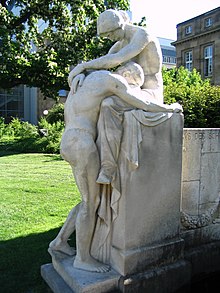Remorse
Repentance is the feeling - in special cases an affect - of dissatisfaction, disgust, pain and regret about one's own wrong doing and not doing, connected with the awareness (or feeling) of its worthlessness and injustice as well as with the willful resolution for eventual satisfaction and recovery.
Remorse is different from regret in that people can regret things that are beyond their control. Repentance is associated with a sense of responsibility for the situation.
Individual aspects
The term repentance has a special meaning in many areas (psychological, legal, philosophical, theological, etc.).
Law
In jurisprudence , the moral concept of repentance has found its way into what is known as active repentance . Active repentance eliminates the criminal liability of certain offenses in German criminal law . Resigning from an attempt to commit a criminal act or preventing one's own planned act results in impunity under Section 24 of the German Criminal Code.
The admission of repentance for incorrect application of the law is judicial repentance.
The term is also an important aspect in so-called truth commissions , as they were set up in many countries in the 1990s to solve political crimes and in some cases also to amnesty them .
psychology
Repentance here is also the lasting regret of one's own guilt because of an act or omission that the author judges as reprehensible in retrospect and accuses himself. Repentance is not to be confused with being ashamed of something .
The first reaction to this feeling is usually to withdraw from contact with others. When you withdraw because of guilt, you lose touch with others. When this allows one to fully appreciate the consequences of one's own deed, an opening to repentance arises. Repentance makes the request for apology more acceptable.
Some people with personality disorders , including sociopathy or antisocial personality disorder , have little or no ability to repent.
theology
In principle, one can distinguish between man's repentance and God's repentance.
Regarding human repentance: Many religions offer repentance as a way of making amends for a repented deed through action. In the Catholic Church, repentance is the most important act of the confessor . It is "the pain of the soul and the disgust for the sin committed, combined with the resolution not to sin from now on" (Council of Trent). A distinction is made between perfect repentance, which arises from the awareness of having offended God through sin, and imperfect repentance, which arises from fear of temporal or eternal punishment.
To God's repentance: God repents z. B. the creation of man (Gen 6: 6) and therefore causes the flood to come. Another example is God's election of Saul as king, which he repents in 1 Sam.15. These two passages are the only ones in the Old Testament that express repentance as regret for a past act of God. All other positions are not retrospective, but are geared towards future actions. God can also repent of his threats of judgment or punishment (e.g. Ex 32:14; Jer 42:10), especially when people see their mistakes and turn to him again (Jer 18.8; 26.3.13; Jo 2 , 13; Jon 3:10).
See also
- Guilt
- Shame
- Repeal of unjust Nazi judgments by law of June 25, 1998 ( Federal Law Gazette I p. 2501 )
- Penance (religion) , there in particular: Penance in Judaism (Teschuwa)
- Buddhist confession of repentance
- Tauba
literature
- Jürgen Michael Baerwald: Egoism without remorse - The art of not standing in your own way . Universitas Verlag, Munich 1993, ISBN 3-8004-1292-6 .
- Hanna-Barbara Gerl-Falkovitz : Forgiveness of the Unforgivable? Excursions into landscapes of guilt, repentance and forgiveness. 2nd edition: Text & Dialog, Dresden 2013, ISBN 978-3-943897-01-2 .
- Albert Esser: The phenomenon of repentance. Attempt to illuminate their self-image . Hegner Verlag, Cologne a. a. 1963.
- Ludwig Hödl : Regret . In: Historical Dictionary of Philosophy , Vol. 8 (1992), Sp. 944-951.
- Maria Otto: Repentance and Freedom. Trial about their relationship in the outcome of Sartre's drama. (Symposion Vol. 6) Verlag Karl Alber, Freiburg i. Br. / Munich 1961, 2nd edition 1987. ISBN 978-3-495-44035-3
- Reinhold Rieger: Regret . In: Gert Ueding (ed.): Historical dictionary of rhetoric . Darmstadt: WBG 1992ff., Vol. 10 (2011), Col. 1065-1079.
- Erika Wick: On the psychology of repentance. Contribution to the psychology of overcoming guilt in the outcome of an empirical study of prisoners. Haupt Verlag, Bern 1971.
- Reue In: Biblical real and verbal hand concordance by M. Gottfried Büchner and E. Ch. Lutz, H. Riehm, Verlag von Ferd. Riehm, Basel, 1890
Web links
- The concept of "repentance" in Kierkegaard's Philosophical Bites
- Contribution by Deutsche Welle on the subject of "Regret"
Individual evidence
- ↑ J. Hasenfuß in: Lexikon der Psychologie; Vol. 3: Psychodrama - ZZ . Edited by: Wilhelm Arnold u. a., Volume 3, Bechtermünz-Verlag, Augsburg 1997, ISBN 3-86047-508-8 . (P. 1909: "Repentance")
- ↑ Terrance McConnell: Moral Dilemmas . In: Zalta, Edward N. (Ed.): The Stanford Encyclopedia of Philosophy . Metaphysics Research Lab, Stanford University, April 15, 2002 ( stanford.edu [accessed October 28, 2019]).
- ↑ Klaus Ulsenheimer : Basic questions of the withdrawal from the attempt in theory and practice, p. 23 ff. Verlag Walter de Gruyter , Berlin and New York 1976, ISBN 978-3-11-006509-1
- ↑ See BGH judgment 5 StR 747/94 - Rn 76/78
- ^ Catechism of the Catholic Church , No. 1451
- ↑ Jörg Jeremias: Repentance . In: Theologische Realenzyklopädie (TRE) .
- ↑ Kirsten Huxel: Regret . In: Religion Past and Present (RGG) . 4th edition.
